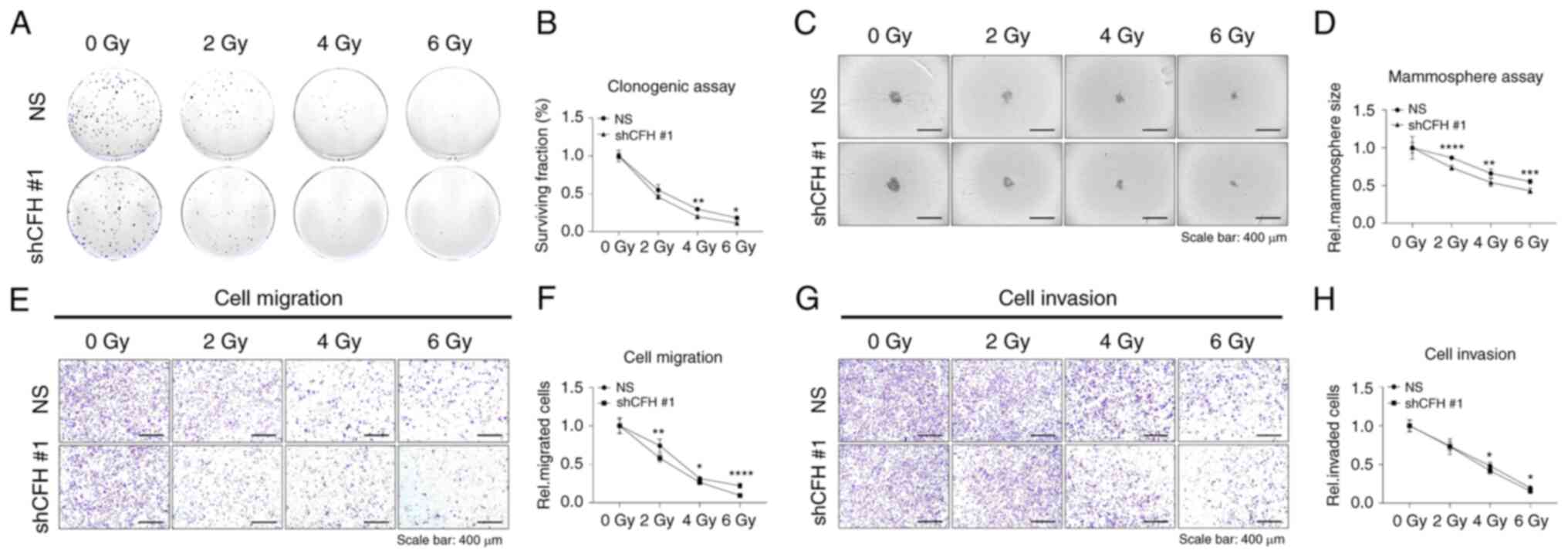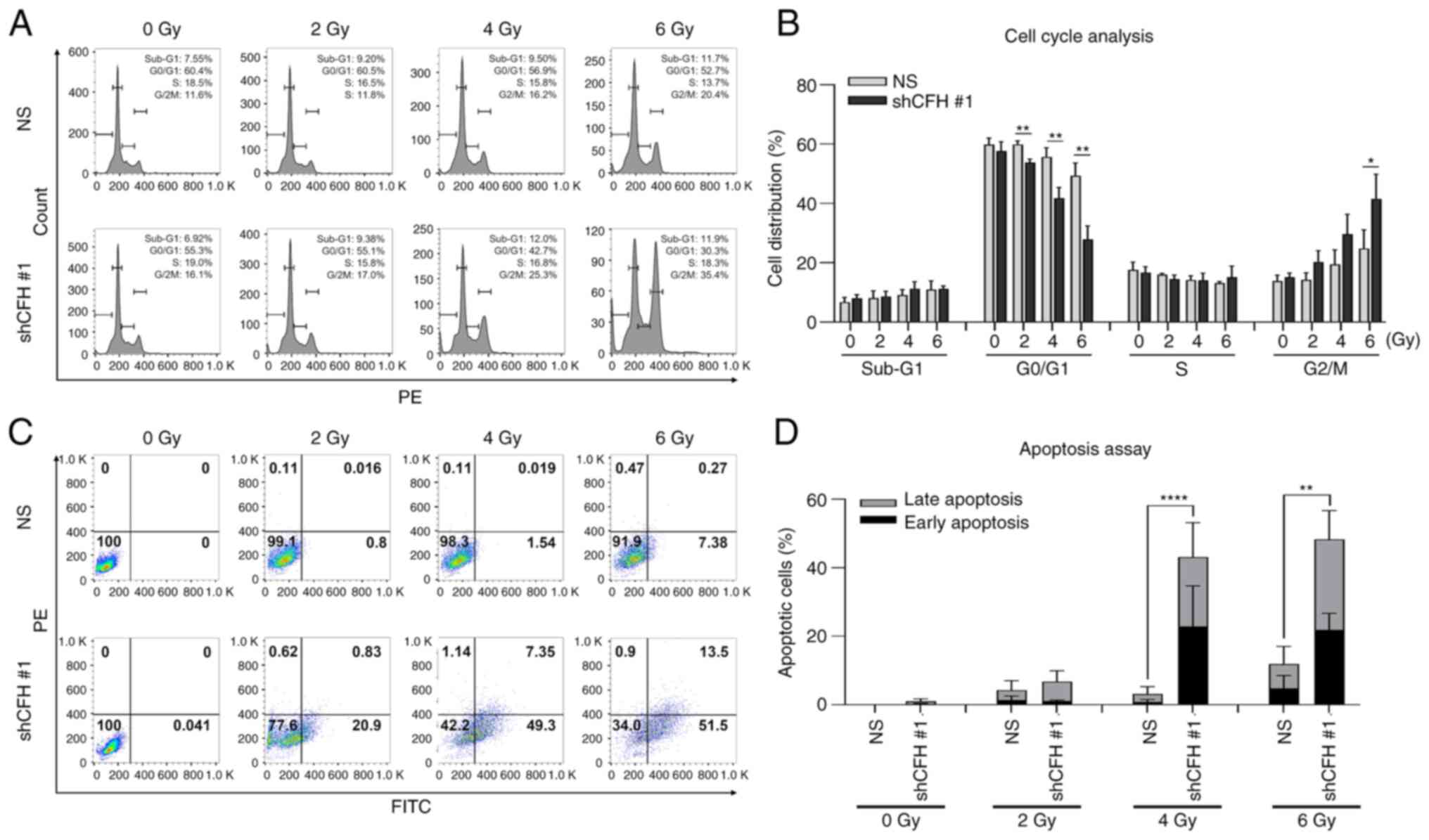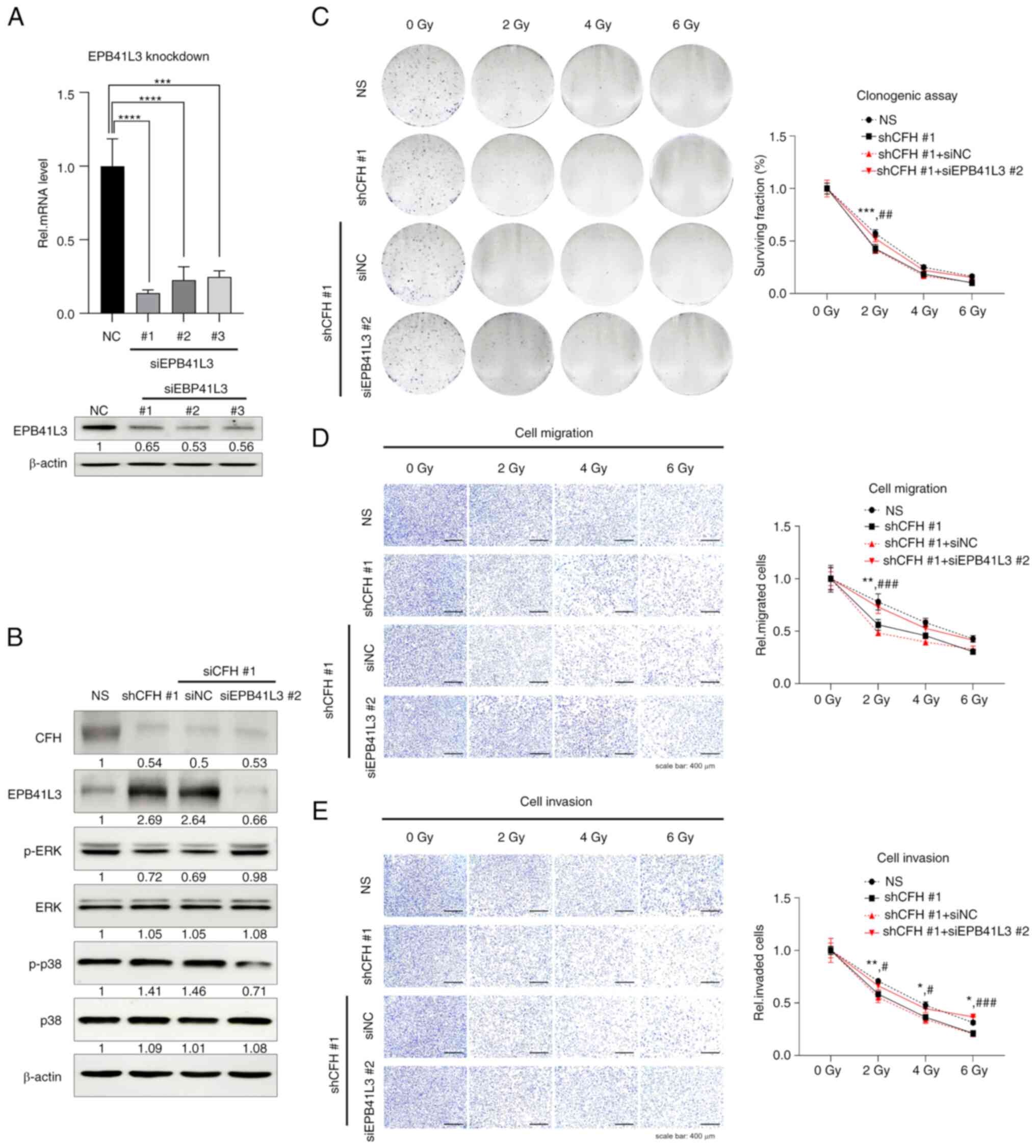|
1
|
Siegel RL, Miller KD and Jemal A: Cancer
statistics. CA Cancer J Clin. 69:7–34. 2019. View Article : Google Scholar : PubMed/NCBI
|
|
2
|
Weigelt B, Peterse JL and van ‘t Veer LJ:
Breast cancer metastasis: Markers and models. Nat Rev Cancer.
5:591–602. 2005. View
Article : Google Scholar : PubMed/NCBI
|
|
3
|
Bai X, Ni J, Beretov J, Graham P and Li Y:
Cancer stem cell in breast cancer therapeutic resistance. Cancer
Treat Rev. 69:152–163. 2018. View Article : Google Scholar : PubMed/NCBI
|
|
4
|
Brooks MD, Burness ML and Wicha MS:
Therapeutic implications of cellular heterogeneity and plasticity
in breast cancer. Cell Stem Cell. 17:260–271. 2015. View Article : Google Scholar : PubMed/NCBI
|
|
5
|
El-Sahli S and Wang L: Cancer stem
cell-associated pathway in the metabolic reprogramming of breast
cancer. Int J Mol Sci. 21:91252020. View Article : Google Scholar : PubMed/NCBI
|
|
6
|
Badve S and Nakshtri H: Breast-cancer stem
cells-beyond semantics. Lancet Oncol. 13:e43–e48. 2012. View Article : Google Scholar : PubMed/NCBI
|
|
7
|
Walcher L, Kistenmacher AK, Suo H, Kitte
R, Dluczek S, Strauß A, Blaudszun AR, Yevsa T, Fricke S and
Kossatz-Boehlert U: Cancer stem cell-Origins and biomarkers:
Perspectives for targeted personalized therapies. Front Immunol.
11:12802020. View Article : Google Scholar : PubMed/NCBI
|
|
8
|
Fultang N, Chakraborty M and Peethambaran
B: Regulation of cancer stem cells in triple negative breast
cancer. Cancer Drug Resist. 4:321–342. 2021.PubMed/NCBI
|
|
9
|
J O'Conor C, Chen T, González I, Cao D and
Peng Y: Cancer stem cells in triple-negative breast cancer: a
potential target and prognostic marker. Biomark Med. 12:813–820.
2018. View Article : Google Scholar : PubMed/NCBI
|
|
10
|
Barzaman K, Karami J, Zarei Z,
Hosseinzadeh A, Kazemi MH, Moradi-Kalbolandi S, Safari E and
Farahmand L: Breast cancer: Biology, biomarkers, and treatments.
Int Immunopharmacol. 84:1065352020. View Article : Google Scholar : PubMed/NCBI
|
|
11
|
Crabtree JS and Miele L: Breast cancer
stem cells. Biomedicines. 6:772018. View Article : Google Scholar : PubMed/NCBI
|
|
12
|
Huang T, Song X, Xu D, Tiek D, Goenka A,
Wu B, Sastry N, Hu B and Cheng SY: Stem cell programs in cancer
initiation, progression, and therapy resistance. Theranostics.
10:8721–8743. 2020. View Article : Google Scholar : PubMed/NCBI
|
|
13
|
Franco SS, Szczesna K, Iliou MS,
Al-Qahtani M, Mobasheri A, Kobolák J and Dinnyés A: In vitro models
of cancer stem cells and clinical applications. BMC Cancer.
16:7382016. View Article : Google Scholar : PubMed/NCBI
|
|
14
|
Afshar-Kharghan V: The role of the
complement system in cancer. J Clin Invest. 127:780–789. 2017.
View Article : Google Scholar : PubMed/NCBI
|
|
15
|
Bajic G, Degn SE, Thiel S and Andersen GR:
Complement activation, regulation, and molecular basis for
complement-related diseases. EMBO J. 34:2735–2757. 2015. View Article : Google Scholar : PubMed/NCBI
|
|
16
|
Lewis LA, Ram S, Prasad A, Gulatin S,
Getzlaff S, Blom AM, Vogel U and Rice PA: Defining targets for
complement components C4b and C3b on the pathogenic neisseriae.
Infect Immun. 76:339–350. 2008. View Article : Google Scholar : PubMed/NCBI
|
|
17
|
Parente R, Clark SJ, Inforzato A and Day
AJ: Complement factor H in host defense and immune evasion. Cell
Mol Life Sci. 74:1605–1624. 2017. View Article : Google Scholar : PubMed/NCBI
|
|
18
|
Cserhalmi M, Papp A, Brandus B, Uzonyi B
and Jozsi M: Regulation of regulators: Role of the complement
factor H-related proteins. Semin Immunol. 45:1013412019. View Article : Google Scholar : PubMed/NCBI
|
|
19
|
Seol HS, Lee SE, Song JS, Rhee JK, Singh
SR, Chang S and Jang SJ: Complement proteins C7 and CFH control the
stemness of liver cancer cells via LSF-1. Cancer Lett. 372:24–35.
2016. View Article : Google Scholar : PubMed/NCBI
|
|
20
|
Daugan MV, Revel M, Thouenon R,
Dargon-Durey MA, Robe-Rybkine T, Torset C, Merle NS, Noé R,
Verkarre V, Oudard SM, et al: Intracellular factor H drives tumor
progression independently of the complement cascade. Cancer Immunol
Res. 9:909–925. 2021. View Article : Google Scholar : PubMed/NCBI
|
|
21
|
Ajona D, Hsu YF, Corrales L, Montuenga LM
and Pio R: Down-regulation of human complement factor H sensitizes
non-small cell lung cancer cells to complement attack and reduces
in vivo tumor growth. J Immunol. 178:5991–5998. 2007. View Article : Google Scholar : PubMed/NCBI
|
|
22
|
Junnikkala S, Hakulinen J, Jarva H,
Manuelian T, Bjørge L, Bützow R, Zipfel PF and Meri S: Secretion of
soluble complement inhibitors factor H and factor H-like protein
(FHL-1) by ovarian tumour cells. Br J Cancer. 87:1119–1127. 2002.
View Article : Google Scholar : PubMed/NCBI
|
|
23
|
Smolag KI, Mueni CM, Leandersson K,
Jirström K, Hagerling C, Mörgelin M, Barlow PN, Martin M and Blom
AM: Complement inhibitor factor H expressed by breast cancer cells
differentiates CD14+ human monocytes into
immunosuppressive macrophages. Oncoimmunology. 9:17311352020.
View Article : Google Scholar : PubMed/NCBI
|
|
24
|
Liu M, Yang YJ, Zheng H, Zhong XR, Wang Y,
Wang Z, Wang YG and Wang YP: Membrane-bound complement regulatory
proteins are prognostic factors of operable breast cancer treated
with adjuvant trastuzumab: A retrospective study. Oncol Rep.
32:2619–2627. 2014. View Article : Google Scholar : PubMed/NCBI
|
|
25
|
Pereira B, Chin SF, Rueda OM, Vollan HKM,
Provenzano E, Bardwell HA, Pugh M, Jones L, Russell R, Sammut SJ,
et al: The somatic mutation profiles of 2,433 breast cancers
refines their genomic and transcriptomic ladnscapes. Nat Commun.
7:114792016. View Article : Google Scholar : PubMed/NCBI
|
|
26
|
Livak KJ and Schmittgen TD: Analysis of
relative gene expression data using real-time quantitative PCR and
the 2(−Delta Delta C(T)) method. Methods. 25:402–408. 2001.
View Article : Google Scholar : PubMed/NCBI
|
|
27
|
Liu X, Xiao Q, Bai X, Yu Z, Sun M, Zhao H,
Mi X, Wang E, Yao W, Jin F, et al: Activation of STAT3 is involved
in malignancy mediated by CXCL12-CXCR4 signaling in human breast
cancer. Oncol Rep. 32:2760–2768. 2014. View Article : Google Scholar : PubMed/NCBI
|
|
28
|
Trautmann F, Cojoc M, Kurth I, Melin N,
Bouchez LC, Dubrovska A and Peitzsch C: CXCR4 as biomarker for
radioresistant cancer stem cells. Int J Radiat Biol. 90:687–699.
2014. View Article : Google Scholar : PubMed/NCBI
|
|
29
|
Yuan X, Piao L, Wang L, Han X, Zhuang M
and Liu Z: Pivotal roles of protein 4.1B/DAL-1, a FERM-domain
containing protein, in tumor progression. Int J Oncol. 55:979–987.
2019.PubMed/NCBI
|
|
30
|
Yuan X, Piao L, Wang L, Han X, Tong L,
Shao S, Xu X, Zhuang M and Liu Z: Erythrocyte membrane protein band
4.1-like 3 inhibits osteosarcoma cell invasion through regulation
of Snai1-induced epithelial-to-mesenchymal transition. Aging.
13:1947–1961. 2020. View Article : Google Scholar : PubMed/NCBI
|
|
31
|
Vlaicu SI, Tatomir A, Rus V and Rus H:
Role of C5b-9 and RGC-32 in cancer. Front Immunol. 10:10542019.
View Article : Google Scholar : PubMed/NCBI
|
|
32
|
Lagadec C, Vlashi E, Donna LD, Dekmezian C
and Pajonk F: Radiation-induced reprogramming of breast cancer
cells. Stem Cells. 30:833–844. 2012. View Article : Google Scholar : PubMed/NCBI
|
|
33
|
Kola P, Nagesh PKB, Roy PK, Deepak K, Reis
RL, Kundu SC and Mandal M: Innovative nanotheranostics: Smart
nanoparticles based approach to overcome breast cancer stem cells
mediated chemo- and radioresistances. Wiley Interdiscip Rev Nanomed
Nanobiotechnol. 15:e18762023. View Article : Google Scholar : PubMed/NCBI
|
|
34
|
Jain V, Kumar H, Anod HV, Chand P, Gupta
NV, Dey S and Kesharwani SS: A review of nanotechnology-based
approaches for breast cancer and triple-negative breast cancer. J
Control Release. 326:628–647. 2020. View Article : Google Scholar : PubMed/NCBI
|
|
35
|
Song K and Faraneh M: Signaling pathways
governing breast cancer stem cells behavior. Stem Cell Res Ther.
12:2452021. View Article : Google Scholar : PubMed/NCBI
|
|
36
|
Zheng Q, Zhang M, Zhou F, Zhang L and Meng
X: The breast cancer stem cells traits and drug resistance. Front
Pharmacol. 11:5999652021. View Article : Google Scholar : PubMed/NCBI
|
|
37
|
Yoon YH, Hwang HJ, Sung HJ, Heo SH, Kim
DS, Hong SH, Lee KH and Cho JY: Upregulation of complement factor H
by SOCX-1/3-STAT4 in lung cancer. Cancers (Basal). 11:4712019.
View Article : Google Scholar
|
|
38
|
Martin M, Leffler J, Smolag KI, Mytych J,
Björk A, Chaves LD, Alexander JJ, Quigg RJ and Blom AM: Factor H
uptake regulates intracellular C3 activation during apoptosis and
decreases the inflammatory potential of nucleosomes. Cell Death
Differ. 23:903–911. 2016. View Article : Google Scholar : PubMed/NCBI
|
|
39
|
Mao X, Zhou L, Tey SK, Ma APY, Yeung CLS,
Ng TH, Wong SWK, Liu BHM, Fung YME, Patz EF Jr, et al: Tumour
extracellular vesicle-derived complement factor H promotes
tumorigenesis and metastasis by inhibiting complement-dependent
cytotoxicity of tumour cells. J Extracell Vesicels. 10:e120312020.
View Article : Google Scholar : PubMed/NCBI
|
|
40
|
Gupta N, Mohan CD, Shanmugam MK, Jung YY,
Chinnathambi A, Alharbi SA, Ashrafizadeh M, Mahale M, Bender A,
Kumar AP, et al: CXCR4 expression is elevated in TNBC patient
derived samples and Z-guggulsterone abrogates tumor progression by
targeting CXCL12/CXCR4 siganling axis in preclinical breast cancer
model. Environ Res. 232:1163352023. View Article : Google Scholar : PubMed/NCBI
|
|
41
|
Alsaab HO and Almalki AH: Anti-HSP70
alleviates cell migration and proliferation in colorectal cancer
cells (CRC) by targeting CXCR4 (in vitro study). Med Oncol.
40:2562023. View Article : Google Scholar : PubMed/NCBI
|
|
42
|
Zhao H, Jiang R, Zhang C, Feng Z and Wang
X: The regulatory role of cancer stem cell marker gene CXCR4 in the
growth and metastasis of gastric cancer. NPJ Precis Oncol.
7:862023. View Article : Google Scholar : PubMed/NCBI
|
|
43
|
To SQ, Dmello RS, Richards AK, Ernst M and
Chand AL: STAT3 signaling in breast cancer: Multicellular actions
and therapeutic potential. Cancers (Basel). 14:4292022. View Article : Google Scholar : PubMed/NCBI
|
|
44
|
Zeng R, Liu Y, Jiang ZJ, Huang JP, Wang Y,
Li XF, Xiong WB, Wu XC, Zhang JR, Wang QE and Zheng YF: EPB41L3 is
a potential tumor suppressor gene and prognostic indicator in
esophageal squamous cell carcinoma. Int J Oncol. 52:1443–1454.
2018.PubMed/NCBI
|
|
45
|
Lu Y, Liu B, Liu Y, Yu X and Cheng G: Dual
effects of active ERK in cancer: A potential target for enhancing
radiosensitivity. Oncol Lett. 20:993–1000. 2020. View Article : Google Scholar : PubMed/NCBI
|
|
46
|
Sambade M, Camp JT, Kimple RJ, Sartor CI
and Shields JM: Mechanism of lapatinib-mediated radiosensitization
of breast cancer cells is primarily by inhibition of the
Raf>MEK>ERK mitogen-activated protein kinase cascade and
radiosensitization of lapatinib-resistant cells restored by direct
inhibition of MEK. Radiother Oncol. 93:639–644. 2009. View Article : Google Scholar : PubMed/NCBI
|
|
47
|
He H, Lin K, Zou C, Pan J, Fu W, Zhou Y,
Lin H, Chen C and Su Y: Knockdown of annexin A2 enhances
radiosensitivity by increasing G2/M-phase arrest, apoptosis and
activating the p38 MAPK-HSP27 pathway in nasopharyngeal carcinoma.
Front Oncol. 12:7695442022. View Article : Google Scholar : PubMed/NCBI
|
|
48
|
Zhou Y, Zhao W, Xie G, Huang M, Hu M,
Jiang X, Zeng D, Liu J, Zhou H, Chen H, et al: Induction of
Nur77-dependent apoptotic pathway by a coumarin derivative through
activation of JNK and p38 MAPK. Carcinogenesis. 35:2660–2669. 2014.
View Article : Google Scholar : PubMed/NCBI
|
|
49
|
Tang J, Wu W, Yang F, Liu L, Yang Z, Liu
L, Tang W, Sun F and Lin H: Marine sponge-derived smenospongine
preferentially eliminates breast cancer stem-like cells via
p38/AMPKa pathways. Cancer Med. 7:3965–3976. 2018. View Article : Google Scholar : PubMed/NCBI
|





















